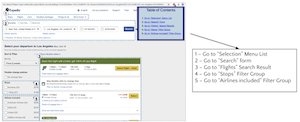
Navigating back-and-forth between segments in webpages is well-known to be an arduous endeavor for blind screen-reader users, due to the serial nature of content navigation coupled with the inconsistent usage of accessibility enhancing features such as WAI-ARIA landmarks and skip navigation links by web developers. Without these supporting features, navigating modern webpages that typically contain thousands of HTML elements in their DOMs, is both tedious and cumbersome for blind screen-reader users. Existing approaches to improve non-visual navigation efficiency typically propose 'one-size-fits-all' solutions that do not accommodate the personal needs and preferences of screen-reader users. To fill this void, in this paper, we present sTag, a browser extension embodying a semi-automatic method that enables users to easily create their own Table Of Contents (TOC) for any webpage by simply 'tagging' their preferred 'semantically-meaningful' segments (e.g., search results, filter options, forms, menus, etc.) while navigating the webpage. This way, all subsequent accesses to these segments can be made via the generated TOC that is made instantly accessible via a special shortcut or a repurposed mouse/touchpad action. As tags in sTag are attached to the abstract semantic segments instead of actual DOM nodes in the webpage, sTag can automatically generate equivalent TOCs for other similar webpages, without requiring the users to duplicate their tagging efforts from scratch in these webpages. An evaluation with 15 blind screen-reader users revealed that sTag significantly reduced the content-navigation time and effort compared to those with a state-of-the-art solution.